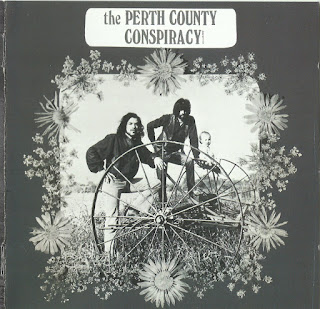Richard Supa, the New York-born singer-songwriter/guitarist known as the composer of ‘Chip Away the Stone’, recorded by Aerosmith and Humble Pie. Following last year's first album under the name Supa's Jamboree, his second album, Homespun (1972), has now been released on CD.
As a boy, Richard Supa (real name Richard Goodman) vaguely dreamed of becoming a songwriter whose name would appear in small print on the hit records of Elvis Presley and Chuck Berry. His career began in the mid-1960s with the Long Island band Dennis Belline & The Rich Kids. Following the Northern soul single "It Happens That Way/ Little Lonely Girl‘ (RCA Victor) in August 1965, followed by the album ’Dennis Belline & The Rich Kids" (RCA Victor) the following year. The album featured danceable covers of songs ranging from The Beatles (‘Rain’, ‘The Night Before’) to The Young Rustics (‘Do You Feel It?’), Motown (‘Mickey Monkey’ ‘Mustang Sally’) and Burt Bacharach numbers (‘Any Day Now’), all danceable covers. The label marketed this early incarnation, fronted by Berrini's blue-eyed soul-style vocals, as rivals to the Young Rascals. The following year saw the release of the studio recording ‘Money Isn't Everything/Summer Girl’ (June 1966/RCA Victor), followed by Dennis Belline's solo release ‘Grey City Day/Outside the City’ (December 1966/RCA Victor).
Around 1968, the Rich Kids became the house band at The Barge club in East Quogue, New York, and were active on the East Coast live scene, based on the college/coffee house circuit. They changed their name to MAN in 1969. Bob Johnston and Nee, who were also part of the production team for Bob Dylan's Columbia release that same year, “Nashville Skyline”, served as producer and engineer.
Welcoming Le Wilburn, they released their sole album, Man (Columbia). The quintet comprised Spa (g, vo), Dennis Belline (g, p, vo), Richie Cardenas (b, vo), Gilbert Slavin (key, harpsichord, f), and Anthony Krzinski (ds, perc, harmonica). The highlight is “Sister Salvation” (Krzinski/Sara & Dennis Belline), featuring a gospel-like intro and a catchy melody. Moving beyond 60s-style blues rock and psychedelic rock, their style hinted at the later radio-oriented mainstream rock trend. In that sense, it was perhaps an album ahead of its time.
After the group disbanded, Dennis Belline released the solo single ‘Living Without You / Forget About Me’ (March 1970 / Columbia / A-side a Randy Newman cover). Meanwhile, Supa also released his first album, Supa's Jamboree, on the Paramount label in 1971. This featured a regular band comprising Liberty David (ds, perc), Ivan Elias (b), Jonathan Hipps (key, p) were joined by members of the Atlanta Rhythm Section: Dean Daughtry(key, org), J.R. Cobb (acoustic g), Barry Bailey (electric g), Robert Nicks (ds), Paul Goddard (b) and others as guest musicians. The arrangement credits are listed as ‘Richard Supa & Jamboree’, while the label side credits read ‘Supa's Jamboree / Supa’. According to the original LP liner notes, ‘Supa's Jamboree’ appears to be Richard Supa's new group comprising David, Hips, and Elias.
The Atlanta Rhythm Section, who participated on two tracks, formed in 1970 from former members of two Southern bands active in the 60s: the Classics IV and the Candymen. Their first gold disc was their sixth album from 1977, 'Rock “n” Roll Soul' (Polydor) in 1977. Compared to other Macon/Capricorn acts, they were late bloomers as a Southern rock band, but thanks to Rodney Mills (engineer) and Buddy Buie (later ARS's manager), they established themselves locally in Atlanta in 1970.
As the house band at Studio One, they gained experience through various recording sessions. Supa's debut album thus became one of the very first releases from Studio One/ARS (the studio closed in 1989). Whereas the previous album featured them only on select tracks, this second album, “Homespun” (1972/Paramount/Jacket notation: Supa, Label notation: Richard Supa), saw the Atlanta Rhythm Section members—Robert Nicks (ds), Barry Bailey (g), Paul Goddard (b), J.R. Cobb (key), Rodney Justo (vo) — provided full backing (with Dobro player Howard Emerson and keyboardist Jonathan Hipps continuing their participation). Alongside originals, it included a re-recording of Smokey Robinson & The Miracles' '6 and a re-recording of a song by Mann, who had once been a member. His blues/R&B/country-based rock “n” roll/swamp rock possessed an East Coast sophistication amidst its grit, hinting at his later connection with Steven Tyler (Aerosmith).
Naturally, his strengths lay not only in songwriting but also in his distinctive, understated vocals, particularly on mellow ballad numbers. He subsequently released two albums under the name “Richard Supa”: “Life Line” (1976 / Epic) and “Tall Tales” (1978 / Polydor). However, the most notable aspect of his subsequent career remains his long-standing partnership with Steven Tyler. Following “Chip Away the Stone” (the author's version featured on “Tall Tales”), which was also covered by Humble Pie, he provided Aerosmith with songs such as “Lightning Strike” (1982), 'Amazing' (1993 / co-written with Tyler), and “Pink” (1997 / co-written with Tyler). When Joe Perry left in 1979, he even stepped in as a support guitarist until a replacement was found. Following the unexpectedly huge response to “Amazing”, based on his own experience of recovering from over twenty years of drug addiction, Supa now works at the Recovery Unplugged Treatment Centre in Fort Lauderdale, Florida, a rehabilitation facility for drug and alcohol sufferers.
by Masaru Konishi, October 2016
Tracks
1. Motorcycle Man - 4:54
2. Tractor To His Trade - 4:03
3. Goshen Road - 3:58
4. Heap-a-Trouble - 3:32
5. Sister Salvation (Denny Belline, Jerry Leiber, Mike Stoller, Sandra Belline, Tony Krasinski) - 2:49
6. Tracks Of My Tears (Marvin Tarplin, Smokey Robinson, Warren Moore) - 3:55
7. Ride The Wild House - 3:14
8. Rainbows Colored Right - 4:18
9. Monkey Joe - 4:31
All songs by Richard Supa except where noted
Personnel
*Richard Supa - Acoustic Guitar, Electric Guitar, Vocals
*Robert Nicks - Drums
*Barry Bailey - Guitar
*Paul Goddard - Bass
*J.R. Cobb - Acoustic Guitar
*Rodney Justo - Vocals
*Howard Emerson - Dobro
*Jonathan Hipps - Keyboards
Related Acts





















